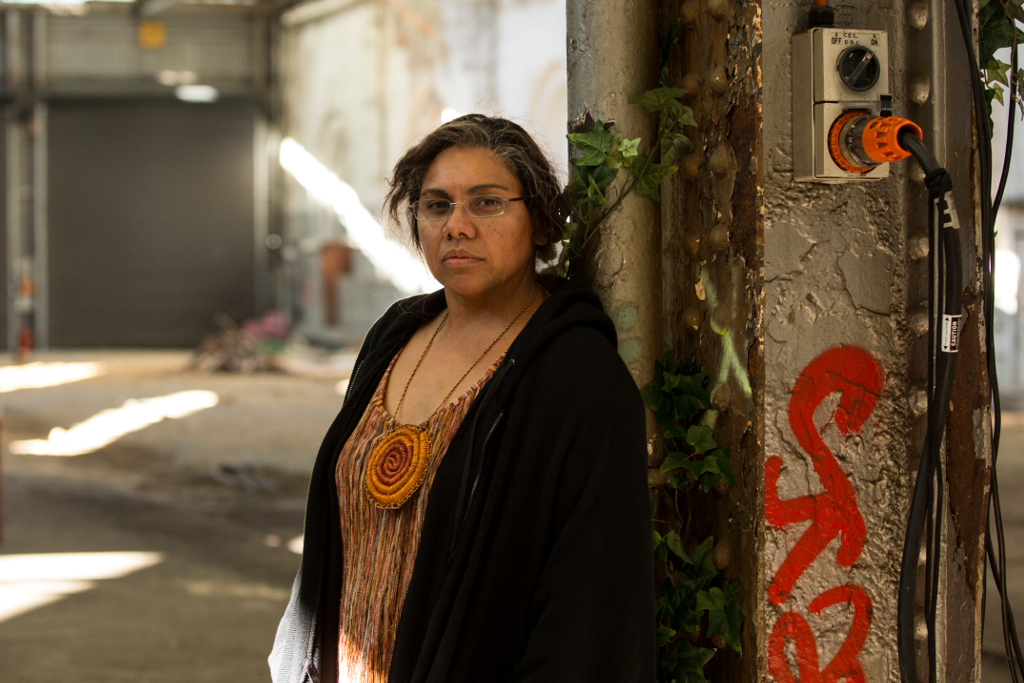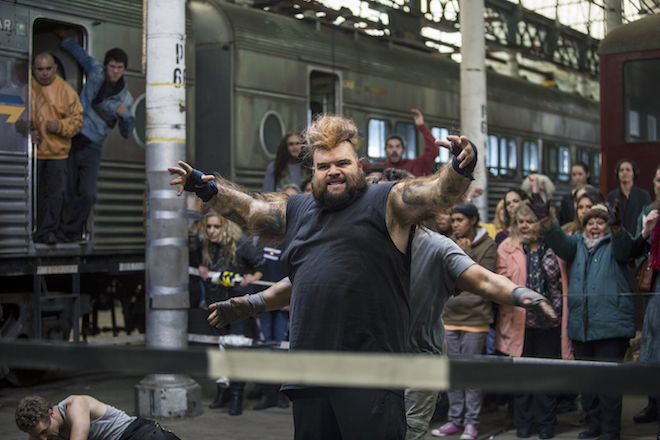Deborah Mailman: ‘Cleverman’ Is Australian TV At Its Best And Australian Politics At Its Worst
"Our youth are going to bloody change this world. I believe that in my heart, but -- sorry to get emotional -- it’s gotta change. It’s gotta change."

Next week, Cleverman will make its premiere on the ABC, offering up an exhilarating vision of what Australian TV can be.
Directed by local powerhouses Wayne Blair (The Sapphires, Redfern Now) and Leah Purcell (Redfern Now, Black Chicks Talking), and with an 80 percent Indigenous cast, the six-part series tells the story of an Indigenous superhero, combining sci-fi, fantasy, politics, Indigenous mythology and history. It raises the bar on both the quality and diversity of Australian TV at a time in which the nation is wising up to a traditionally whitewashed entertainment industry. And it does all this while literally kicking ass.

In a dystopic near-future, Sydney is divided between The City and The Zone. Home to the poor and disenfranchised, The Zone is also the refuge of “The Hairies”: a minority species inspired by creatures from Indigenous storytelling who are branded “sub-human” by the government (repped by a Dutton-esque creep) and locked up in “containment facilities”. The urgency of the show’s political commentary more than justifies its lack of subtlety.
Among Cleverman’s dynamic ensemble cast — Jack Charles, Hunter Page-Lochard, Rob Collins, Iain Glen, Frances O’Connor, Stef Dawson, Tony Briggs, Rarriwuy Hick, and rapper Briggs — is the beloved Deborah Mailman (The Sapphires, Redfern Now, Offspring, The Secret Life of Us). The four-time Logie winner plays the ballsy Aunt Lindy.
Shortly after Cleverman had its world premiere at the Berlin International Film Festival earlier this year, I spoke to Mailman about roles for Indigenous actors, genre and the power a show has to affect real political change. Warm, disarmingly sincere and even a little teary, Mailman — who is a member of Mt Isa’s Kalkadoon people — spoke with equal warmth and pride for the series as well as anger and sadness for the state of the nation it reflects.
–
Junkee: I was at yesterday’s screening and saw you looking euphoric. I’m guessing that was the first time you’d seen the show?
Deborah Mailman: Yeah, Stef [Dawson] and I — we couldn’t believe, that we were part of something so original and so different. It’s so beautiful and cinematic. This is a bit of an indescribable moment but I was like, “Yes!” [pumps fists].
When the comic musical Bran Nue Day was released in 2009, you spoke about a goal for yourself, as an actor, of making Indigenous content that was pushing genre and flipping audience expectations. Cleverman feels like a brilliant next step.
Definitely. In terms of the Indigenous audience — for them to have themselves represented on screen and have familiarity of a show like this, that’s what I’m about. And you know, it takes the brain of someone like [creator] Ryan Griffen.
One of the reasons he made Cleverman was that he wanted to create a black superhero for his son. I just think that’s such a beautiful place to come from. It’s that sort of heart that carries through. That’s what I get affected by, as an actor. You read it in the script.
Growing up, were there any TV figures or superheroes you could relate to?
No, and that’s the thing. There were only one or two Indigenous actors but nothing that was familiar to me. I guess I grew up North American, because there was nothing [on Australian TV] I could relate to. It’s about time that we started.
Cleverman has an 80 percent Indigenous cast, and a lot of the people involved, like Wayne Blair and Leah Purcell, whom you’ve worked with frequently, have been rightly described as the vanguard of indigenous filmmaking and TV.
It is exciting, and it’s right across the board. I think what’s happening in the Indigenous industry is some of the most exciting work coming out at the moment. And I think people are realising that. To have that targeted support for two decades to develop our voices, from that you get shows from Redfern Now to Black Comedy. It takes that time and that effort. And it’s great — as artists, outside of being blackfellas — we’re now getting the opportunity to tell our stories in whatever way we want, whatever genre we want.
The Housewives of Narromine?
Yeah! [Laughs]. This is a great time to be working.
For me, Cleverman was so affecting because it’s dystopia, it’s horror, it’s Cronenberg-esque gore and CGI-animated violence, and yet it felt like such an accurate representation of contemporary Australia.
I think it does for all of us. In terms of the country that we’re in, in terms of persecution, in terms of people doing horrendous things without humanity in those actions…
I full-body shuddered in the opening episode when the Minister for Immigration said, “I’m a flat white kind of guy”.
We’re soon to see what the reaction is of those who aren’t converted. Even if they come to it in the first place, you know, we’re not going to change everyone’s minds. I don’t have that hope.
Sitting alongside the politics, it’s also a story about love and community, family.
Yes! It’s all about family. It does really become about the reconciliation of that family too — there’s so much animosity and all the relationships are strained because of their past family tragedy. So there’s a lot of healing going on. Everyone is fighting for survival in some way or another.
What about your character, Aunty Linda?
Yeah, I love her. She’s a pot-smoking aunty and she’s sick as a dog but she don’t care. She’s accepted her fate. She says, ‘Nah, I’m dying. More importantly, what are you going to do about what’s been given you? Don’t worry about me, I’m fine.’ I like that about her.
Though Cleverman has this strong, dramatic core, it’s new territory for you as an actor.
I think for our industry as a whole. I mean, what other show in Australia is like this? That’s what I’m excited by, because it’s raising the bar in terms of the quality of drama that we can make, instead of a middle-of-the-road… I love when dramas take a little bit of risk. And to have that endorsement from Sundance TV, from an international audience, is really something. I think we need that as an Australian drama; it can be international but it needs that Australian voice. And we can still make bloody great television!
Ryan’s concept of the sci-fi and fantasy mixing with the politics and the mythology is so striking when you first hear it, but then when you’re watching, it feels really natural.
Yes! There’s a reality to it, and a domesticity about it. The spirit world is coming down and taking its place and having all these events occurring. I just frigging love that shit.
The Cleverman comes up in numerous Indigenous stories in different ways [often a conduit between the Dreaming and this world], which were combined in the series. Were you familiar with the story of the Cleverman?Oh yeah, yeah, yeah. Same as the Hairies. It was like, growing up — and I’m not saying this is everyone’s experience — but the Hairyman is almost a bogeyman. People would say, “Do that and the Hairyman will get you”. And there are different Hairymen depending on what country and what the responsibility is. That’s why we say it’s “inspired by”; because we’ve created our own Cleverman, it’s not the Cleverman.
Stepping into this world then, there’s already lots for you to connect with.
Yeah, although a lot of the show is to do with the Namorrodor (from the Northern Territory) which I didn’t know about. The Namorrodor hunts the young and the sick. And this is what’s really wonderful, that you get to know another mob, to hear and learn about other stories. Depending on country, it’s all very different. Some are very significant to an area and don’t play anywhere else.
For example, the Hairy Men are speaking Gumbaynggirr, which is from the east coast of NSW. People hearing can go, “What is that? Oh, it’s this.” That’s putting that language out there, allowing people to know and understand… When you look at how Aboriginal culture is passed down orally — through song, through dance, through music, all of that — so much has been lost. For some time now, there’s really been a push to reclaim and try to document.
Do you feel the show is part of that process?
Without a doubt. And that’s how we can contribute towards that conversation, as artists.
I feel like even if, at times, I lose faith in politics as a way to move forward, something like Cleverman comes along — a show, or a cultural artefact — and it’s like, okay, we’re getting somewhere, a voice is getting out.
That’s why we bloody do what we do, you know? We were talking about it the other day; even if just one little Indigenous kid in the community, if it does something to them, that’s all it takes.
One of the great things about the arts and film is that you can say the truth and veil it because it’s sort of removed. Maybe it’s easier to come to than reading it in the papers or seeing it as a documentary. When you see things like the Hairy family [being arrested] and the death of the little girl, you hope that moves people in some way to understand that that treatment, that persecution, no matter who you are, is a horrendous act. To tear families apart, to divide people in that way, to say, ‘You are unacceptable because I am scared of you, therefore we’re just going to get rid of you, exterminate your whole race, because you don’t agree with my ideology…’
My faith lies in the young generation. Our youth are going to bloody change this world. I believe that in my heart, but — sorry to get emotional — it’s gotta change. It’s gotta change.
–
Cleverman premieres on ABC at 9.30pm June 2.
–
Annabel Brady-Brown is a founding editor of Fireflies, a film magazine, and an online editor for The Lifted Brow.
